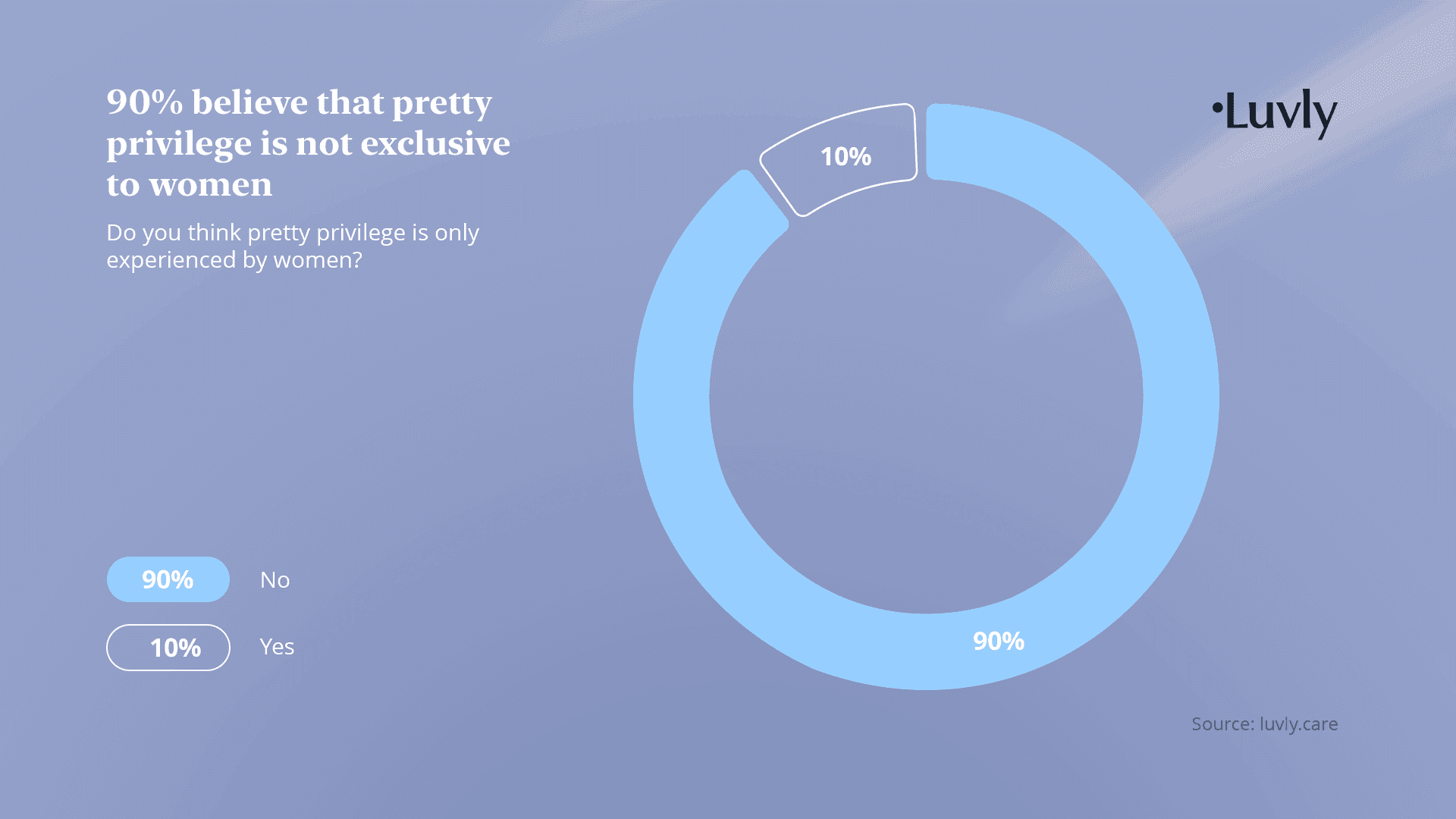Face Yoga
Pretty Privilege: How Looks Really Shape Our World
Written by Valeria ZhyvotovaUpdated on 24 Mar 2025
Face Yoga
Pretty Privilege: How Looks Really Shape Our World
Written by Valeria Zhyvotova.Updated at 24 Mar 2025
We’ve all probably come across the term ‘face card’ – the social media meme used to describe someone who is so good-looking that they don’t have to pay for anything.
While the face card might be a particularly extreme example, there is no doubt that, when it comes to getting a good deal from the world, our looks do play a role. It might not be terribly fair, of course, but don’t expect it to change anytime soon.
How exactly do our looks shape the way we interact with the world? And how do those blessed with good looks – and those who consider themselves to be in the opposite situation – experience ‘pretty privilege’ in their day-to-day lives?
To find out, Luvly spoke to 2000 people to find out what they really think about everything from pretty privilege to face cards and objectification and appearance-based discrimination.
Perceptions of pretty privilege
It’s no secret that our eyes are drawn to good-looking people, particularly those of the opposite sex. But are these primal forces really shaping the world we live in? Our respondents certainly felt that way, with 75% agreeing with the statement that society has more respect for good-looking folks. Only 15% held the view that prettiness was irrelevant when it came to how someone was treated.A further 10% took a different – and rather interesting – view: that being good-looking could actually lead to people respecting you less (more on that later…)
What does pretty privilege look like on a societal scale – and is the famous face card real? We asked our respondents which parts of life are affected by pretty privilege. Their answers were very illuminating.
Naturally, the most common answer for where looks influence our outcomes was dating, with 73% agreeing that pretty privilege impacts our romantic lives.
After that, the most common answer was the workplace, with 56% of respondents saying that having the face card meant being treated better. Other common answers included customer service (43%) and educational opportunities (20%).
But to really understand pretty privilege we also wanted to ask another question – one that would deal directly with the old stereotype about gender.
Despite what you might think, it turned out just 10% of our respondents felt that only women are affected by pretty privilege (or its absence), with 9 in 10 convinced that men are impacted too.
Personal experiences of pretty privilege
Looking at societal beauty standards is useful when it comes to pretty privilege and the face card. But we also want to know how our respondents had experienced this phenomenon in their own lives. It was clear from our survey that plenty of them considered that they knew people who had pretty privilege. What’s more, many of them confessed to being slightly aggrieved by the situation, feeling it was unfair. Indeed, 58% of respondents said they had felt envy and resentment because of the unfair advantages that others got from holding a face card.Did our respondents admit to treating people differently because of their looks? Interestingly, the vast majority insisted they didn’t favor good-looking people over others.
17% said they had trusted people more on the basis that they were good-looking. But 83% insisted they didn’t let looks influence their judgment when it came to matters of trust.
Had our respondents tried to utilize pretty privilege or their face card to gain unfair advantages? Interestingly, 53% admitted they had used their physical appearance to influence others.
However, there was also evidence that, rather than benefiting from pretty privilege, many people feel they have been disadvantaged by it – i.e. that they have been treated worse because they weren’t good-looking enough.
Almost 1 in 5 of our respondents said that they felt they had been denied a job opportunity because of their looks. Workplace discrimination on looks might not be legal, but that doesn’t mean it isn’t happening.
Downsides of pretty privilege
There was another, slightly counterintuitive aspect of pretty privilege that we needed to confront. Our survey had already suggested that some people thought that being good-looking might even be a burden. So could we find any evidence of that happening in reality – for example, people experiencing objectification or workplace discrimination? Overall, 80% of respondents claimed to have faced at least one challenge due to being good-looking, with being objectified (20%) and facing additional pressure to always be pretty (20%) among the most common problems identified. Alongside objectification, other negative experiences included people assuming they weren’t smart enough (19%); people assuming they had been promoted for their looks (12%); and people assuming they had a bad personality (9%).In a separate question, 30% said that they felt that people judged them as less intelligent because of their looks – showing the persistence of the old sexist stereotype that beauty and brains don’t always go together.
Other downsides are more subtle. For example, our study suggests that at least some of those who are blessed with good looks often feel a sense of guilt that they might be getting an easier ride in life because of them.
28% said they felt this way, with a slightly larger group (37%) suggesting that they were happy to enjoy the benefits that come with looking pretty without worrying too much about the fairness of it all.
Methodology: To create this study, Luvly surveyed 2000 people. The ages ranged from 18-25 (34%), 26-29 (21%), 30-39 (24%), 40-49 (14%), 50+ (7%).










